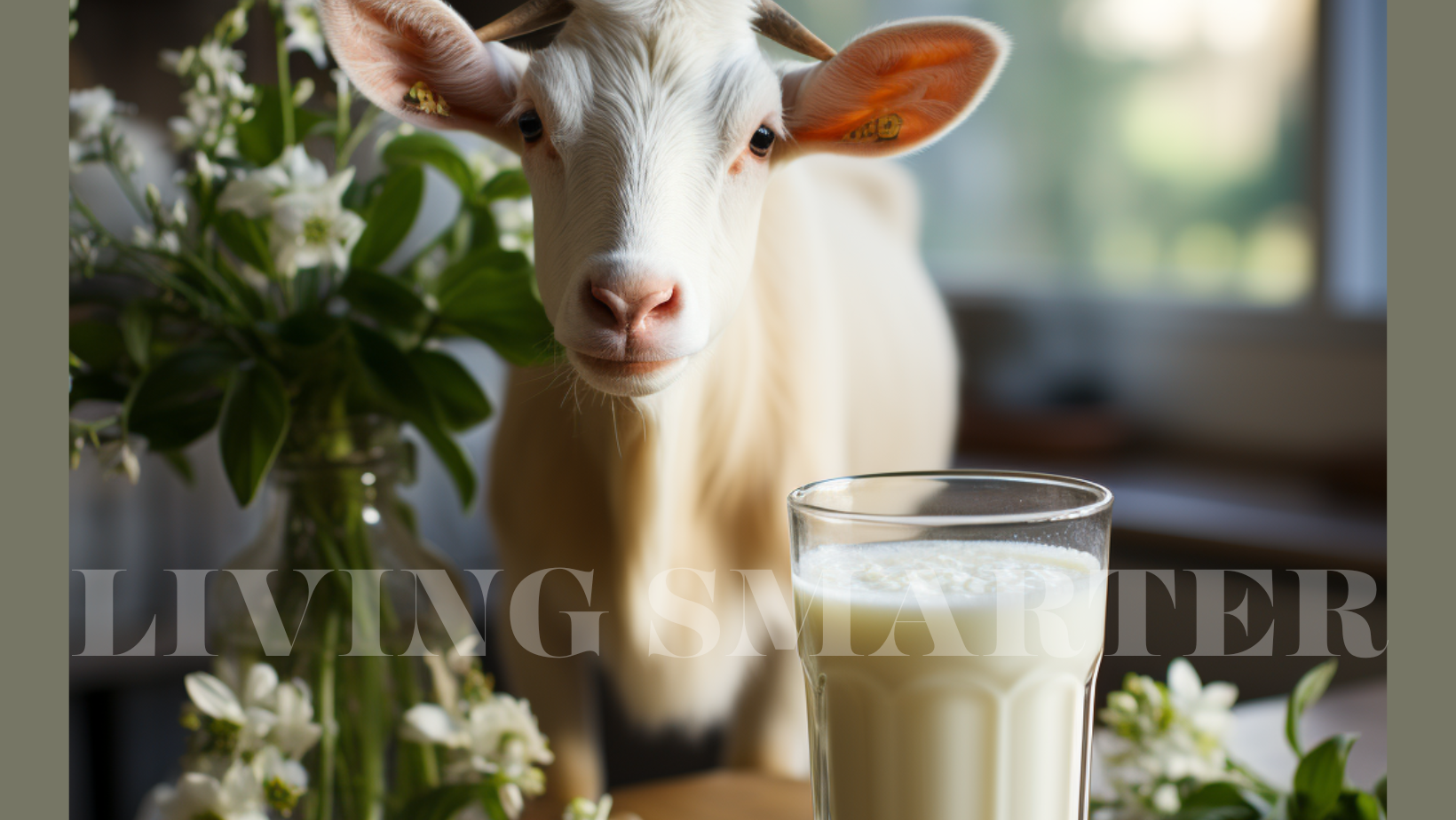The Science behind Goats Milk Protein
and its Health Benefits

Why have Goat's milk?
Got milk?
Working in the field of nutrition and as a colon therapist for so many years, I often hear people relay their opinions on dairy milk and some have become very adamant about the type of milk they consume.
By the way, this is not an article about dairy alternatives (I talk about those more on my You Tube channel, Living Smarter with Fibromyalgia) and I have some recipes for alternatives like macadamia milk you can make at home.
Here we are simply stating some facts about the different types of dairy milks and why we prefer not only goats milk protein, but sheeps milk protein as well.
NOTE: Both goats milk and sheeps milk products have become more widely available in grocery stores and farmers markets.
I love trying the various flavors of both goat and sheep cheese like honey, fig/chili, lavender, blueberry, orange, and more. Do you have a favorite?
Ok, let's get on to some comparisons :
A comparison of three (Cow, Goat, and Sheep)
Cow's milk, goat's milk, and sheep's milk are all sources of dairy and protein, but they differ in several ways, including their nutritional composition and potential health benefits and drawbacks. Here's a comparison of these three types of milk:
- Nutritional Composition:
Fat Content:Cow's Milk: typically contains a higher fat content compared to goat's and sheep's milk, making it creamier. Of course it depends on the product.
Goat's Milk: Goat's milk has a moderate fat content.
Protein:
Cow's Milk: Cow's milk contains a balance of casein and whey proteins.
Goat's Milk: has a higher proportion of certain proteins, like A2 casein, which some people find easier to digest compared to cow's milk.
Sheep's Milk: Sheep's milk also contains A2 casein and is similar in protein composition to goat's milk.
Lactose:Cow's Milk: Cow's milk contains lactose, a type of milk sugar, which can be difficult for some individuals to digest if they are lactose intolerant.
Goat's Milk: also contains lactose but in slightly lower amounts than cow's milk.
Sheep's Milk: Sheep's milk contains lactose similar to goat's milk. - Minerals:
Calcium: All three types of milk are good sources of calcium, which is essential for bone health and various bodily functions.
Phosphorus: These milks also contain phosphorus, important for bone health and energy metabolism.
Magnesium: Sheep's milk tends to have a slightly higher magnesium content compared to cow's and goat's milk. - Vitamins:All three milks provide essential vitamins, including vitamin D, vitamin B12, riboflavin (B2), and others. The vitamin content may vary slightly among the different types of milk.
- Fat Digestibility:
Some people find goat's and sheep's milk easier to digest compared to cow's milk due to differences in protein structure and fat globule size. - Allergenicity:
Some individuals who are allergic to cow's milk may tolerate goat's or sheep's milk better, but it's not guaranteed, as cross-reactivity can occur. - Flavor:Each type of milk has a distinct flavor profile. Goat's milk is often described as tangy or earthy, while sheep's milk is rich and nutty. Cow's milk is milder in flavor.
- Availability:Cow's milk is the most widely available and consumed dairy milk globally. Goat's and sheep's milk are more common in certain regions and may be less readily available in some areas.
- Use in Cheese:Goat's and sheep's milk are often used to make specialty cheeses like goat cheese (chevre) and sheep's milk cheese (pecorino), which have unique flavors and textures.
Ultimately, the choice between cow's, goat's, and sheep's milk depends on individual preferences, dietary restrictions, and nutritional needs.
Some people may prefer the taste and digestibility of one type of milk over another, while others may choose based on cultural or regional traditions.
The structural differences between cow's milk and goat's milk primarily arise from variations in the composition of proteins, fats, and other components. Here's a closer look at the structural distinctions between these two types of milk:
- Protein Composition:Casein Proteins: Both cow's and goat's milk contain casein proteins, but the proportions differ.
Goat's milk has a higher proportion of A2 casein (specifically, A2 beta-casein) compared to cow's milk. Some people find A2 casein easier to digest than the A1 casein predominant in most cow's milk.
Whey Proteins: Cow's and goat's milk also contain whey proteins, including alpha-lactalbumin and beta-lactoglobulin. The relative proportions of these proteins can vary between the two types of milk. - Fat Content:
Both cow's and goat's milk contain a mixture of saturated, monounsaturated, and polyunsaturated fats.
However, the fat composition can differ slightly between the two:
Goat's milk tends to have smaller fat globules compared to cow's milk. Smaller fat globules can make the fat in goat's milk easier to digest and may contribute to its creamy texture.
Cow's milk has a higher overall fat content compared to goat's milk, which contributes to its richer mouthfeel and creaminess.
(by the way, I don't advise low fat dairy products, as they often contain more mucus forming additives like gums AND low fat dairy does not help the body to absorb the calcium) more on that, bottom of article. - Lactose Content:
Both cow's and goat's milk contain lactose, a milk sugar. While the lactose content is relatively similar, some individuals with lactose intolerance may find goat's milk more tolerable due to differences in protein and fat content. - Minerals and Vitamins:The mineral and vitamin content of cow's and goat's milk is largely similar, including essential nutrients like calcium, phosphorus, vitamin D, and B vitamins.
- Flavor and Odor:Goat's milk has a distinctive flavor and aroma that some people describe as tangy or earthy. This flavor is influenced by the types and proportions of fatty acids present.Cow's milk typically has a milder flavor and aroma compared to goat's milk.
- Structural Variations:Goat's milk may have a slightly higher level of certain medium-chain fatty acids (like capric and caprylic acid) compared to cow's milk.
These fatty acids can contribute to the characteristic flavor and aroma of goat's milk.
The smaller fat globules in goat's milk contribute to its unique texture and mouthfeel.
It's worth noting that these structural differences can result in variations in digestibility and tolerance for individuals.
Some people who experience discomfort or digestive issues with cow's milk may find goat's milk to be a more suitable alternative due to its different protein and fat composition.
Below a note about fat content in milk and why that is important.
Fat content of dairy milk
Part of the low fat era led to people consuming more low fat dairy products as well.
The problem is that when we strip the fat out of the dairy, it becomes harder to absorb the CALCIUM in the dairy. (the very thing that people want to get from their dairy milks)
If you are on a lower fat dietary plan for health reasons, consider this fact and change out any unhealthy fats and replace them more often with higher fat dairy options, including ghee and real butter when ghee is not available.
Either way, always consult with your doctor or an informed dietician where needed.
We do address these issues and more in our courses, and in our website here and media pages.
Thanks for visiting,
Lisa (practitioner and trainer specializing in fibro , and long time fellow fibro, yes I get it)
Your first block of text...
Before you leave, my sitemap can provide you with a "God's-eye" view of this website laid out in "outline format".
Stay connected by using the contact form below.
Your second block of text...
Didn't find what you were looking for? Search for it:
living-smarter-with-fibromyalgia.com
©2013-2025 All Rights Reserved
FibroFitPeople, LLC ;©2025 All Rights Reserved









